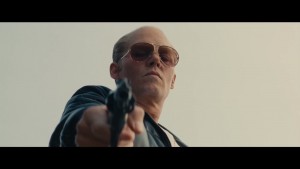
By Amber Dowling
Bio
From The Godfather movies and Goodfellas to Boardwalk Empire and The Sopranos, there has been no shortage of gangster movies infiltrating pop culture. But in 1970s South Boston, there was perhaps no criminal more notorious or feared than one James Bulger – a sociopath with piercing blue eyes and hair so blond people nicknamed him “Whitey.” Not to his face, of course.
Back in his day, the Winter Hill Gang leader became something of a legend thanks to his distinct “partnership” with the FBI, and more specifically with agent John Connolly — a childhood friend who signed Bulger up as a confidential informant, freeing him up to continue his bad behavior while climbing the underworld ranks. It’s a story that has been told through various news reports and novels over the years, but not so often on the big screen. Until now.
Black Mass features Johnny Depp taking on the role of Bulger – complete with hair and makeup that translates better onscreen than it does on the poster – and Joel Edgerton as Connolly. A plethora of familiar faces, including Jesse Plemons, Kevin Bacon, Corey Stoll, Peter Sarsgaard,Benedict Cumberbatch and Dakota Johnson round out the rest of the cast.
Despite the fact that it’s been dubbed the project to break Depp out of his “career slump,” none of the story is told through Bulger’s eyes. Instead, director Scott Cooper hones in on Connolly’s story, and then rounds out the rest of the narrative with confessional interviews as told by Bulger’s former crew. It all culminates in a chilling look at a renowned serial killer, but that doesn’t exactly make it a factual tale.
“We’re telling a true story, but what is the truth?” asked Edgerton ahead ofBlack Mass’s debut at the Toronto International Film Festival. “How much of the truth do we know? At some point you have to plant your flag in the ground and say, ‘This is our truth.’ This is Scott’s vision based on the book.”
“I wasn’t making a documentary and I don’t think audiences come to narrative features for the facts,” added Cooper. “They come for psychological truth, deep emotion and humanity.”
To read more click here.





